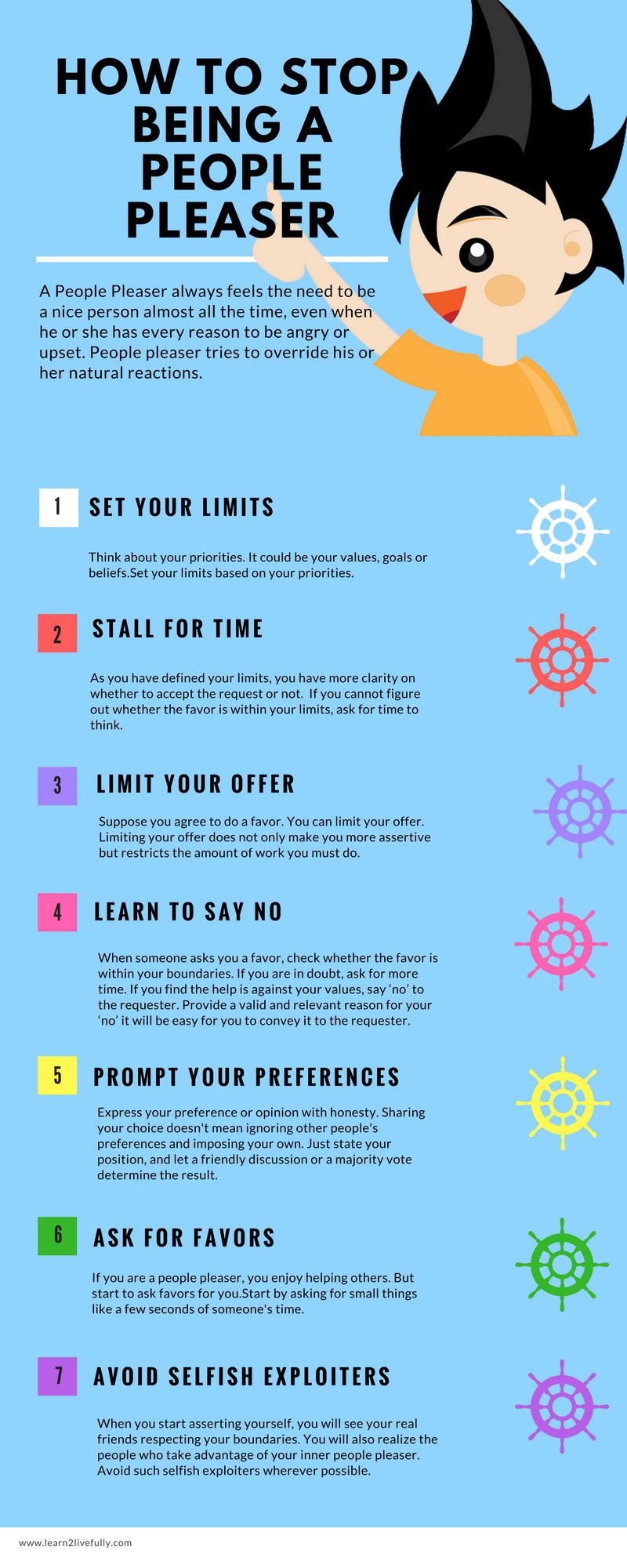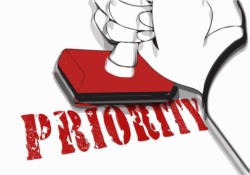People Pleaser, How to stop being a doormat to others?

Do you find it difficult to reveal feelings and opinions if they differ from those of the people around you? Do you over commit yourself? Do you offer your services to get noticed? If you have answered Yes to these questions, probably you are a people pleaser.
Who does not want to improve themselves? Please click here to subscribe to our newsletter. You will get FREE self-improvement tools in your mailbox.
Take a look at the below presentation to know the major points covered in this article.
Who is a People Pleaser?

A People Pleaser always feels the need to be a nice person almost all the time, even when he or she has every reason to be angry or upset. People pleaser tries to override his or her natural reactions. If you are a people pleaser, you sense the need to comply and fit in, so you say ‘yes’ to everything and pretend to share the opinion of the majority even when it is against your values.
Why are you a People Pleaser?

You are a people pleaser because you have a self-image of a good, caring, noble human being. You do not want to hurt other people’s feelings. You want to be good and do only the right things in the world.
Not only that! You want to be perceived as a good kind hearted human being. You want the external circumstances to reflect your self-image. You want evidence, validation and approval of your self-image from others – your boss, friends, parents or spouse. You are relying on other’s approval to uphold your self-image.
Isn’t it a difficult situation? When somebody says, an opinion contradicting your self-image you start to work extra hard to correct that.
Many opportunistic people use this to get what they want. Sometimes these people don’t even recognize that they are mistreating the kindness of their friend, family member, or significant other.
Be aware when you become a people pleaser

I am not saying that being empathetic and caring is bad. I am not suggesting you be a selfish monster not helping others at all. Stop indulging in black and white thinking. Start to practice a middle way. If helping others is what you want, go for it. After all, this world requires more of such kind-hearted people. But when you are aware of you are going to do the favors just to please others, put yourself first before others.
When you live your life with sincerity and authenticity, you cannot hide your true feelings and be a people pleaser. If you do not want to live in resentment and stress, stop putting everybody else’s agenda above yourself.
Here are seven strategies to prevent you from being a people pleaser.

1. Set your limits

Think about your priorities. What is most important to you in your life right now? Your priorities could be your values– such as integrity and compassion – or goals- getting a promotion in your career, paying off your loans -or your beliefs.
Next, set your limits. What kind of favors can you always grant, and what kind only under certain conditions or never? Use your priorities to decide where you are going to draw the line. Phrase the limits this way: “If it means…, I’ll say ‘no.’”
You think that your health is a priority for you. You can say:
“If it means I should eat unhealthy food, I’ll say ‘no.’”
You think that your integrity is a priority for you. You can say:
“If it means I should support anybody’s deception, I’ll say ‘no.’”
Setting your limits based on your priorities; make it easy for you to get rid of the people-pleaser in you.
2. Stall for time

Being a people pleaser, you tend to say ‘yes’ to whatever people ask of you. As you have defined your limits, you have more clarity on whether to accept the request or not. If you cannot figure out whether the favor is within your limits, ask for time to think.
You may say: “Please give me some time, I’ll get back to you.”
Stalling technique gives you enough time to think about the service and weigh up whether you can spend your energy and time on this.
A People Pleaser will find it hard to say ‘no.’ You are breaking the pattern of saying instant ‘yes,’ by delaying the ‘yes.’
If you think you can’t afford to help, you can prepare yourself for saying ‘no.’
Read our article on the power of no here.
3. Limit your offer

Suppose you agree to do a favor. You can limit your offer. Limiting your offer does not only make you more assertive but restricts the amount of work you must do. For a people pleaser, limiting the offer is a much easier task to do than a firm ‘no’ because you offer to help in a small way.
For example:
If your friend asks you: “Can you cook dinner for my party guests?”
You can say: “Yes, but I can’t clean up the dishes.”
If your colleague asks for help and you do not want your work gets affected by the favor.
You can say: “Yes. But I will not be free after 12 p.m.”
4. Learn to say no
[bctt tweet=”If you are a people pleaser, probably the hardest thing for you will be saying ‘no.'” username=”Learn2LiveFully”]
When someone asks you a favor, check whether the favor is within your boundaries. If you are in doubt, ask for more time. If you find the help is against your values, say ‘no’ to the requester.

You do not need to justify your ‘no.’ But if you could provide a reason for your ‘no’ it will be easy for you to convey it to the requester. Choose a valid and relevant reason understandable to even the requester.
When your colleague asks you to stay late to help his work;
You can say “I can’t stay late. I am committed to helping my children with their studies.”
Avoid giving specifics as below:
“I can’t. I have an exam coming up in April and need to prepare for it.”
Such reasons give an indication that you will be ready for the favor after April. If you know that the favor is not within your priorities, then have the courage to let the requester know it.
So, you may say:
“I can’t. I’m cutting back on commitments so that I can focus on my studies.”
To make your response less personal to the requestor, you can give your reason for ‘no’ as a policy.
Your ‘no’ is not to the individual, but the practice.
You may respond to a date request of your colleague.
“I have a policy not to date with my colleagues.”
Read our article on how to love yourself here.
5. Prompt your Preferences

Being a people pleaser also means you never talk about your choices. You tend to allow others to make a choice for you. When people ask your preference, do not dodge their question.
You are going out with your friends. Let’s say your friends choose which film to see at the cinema. The majority wants to watch a horror movie. You hate horror movies, and you would prefer to see the romantic comedy.
How would you respond? Being the good guy you are, you don’t want to spoil your friends’ fun and be seen causing trouble, so when they ask your preference, you vote for the horror movie.
Your response is a typical people pleaser response. As a person trying to overcome people pleasing mentality, how should you respond? You should speak your heart out!
Express your preference or opinion with honesty. Sharing your choice doesn’t mean ignoring other people’s preferences and imposing your own. Just state your position, and let a friendly discussion or majority vote determine the result.
For example:
You are in discussion with your colleagues about next team lunch. Your superior asks, “Would you prefer Italian or Indian cuisine?” Do not opt for Italian just because a couple of others voted for it. If you prefer Indian cuisine, opt for Indian. In case you know the majority of votes are for Italian, still do not hesitate to mention your opinion.
6. Ask for favors

If you are a people pleaser, you enjoy helping others. But start to ask favors for you.
Start by asking for small things like a few seconds of someone’s time.
You may ask your guest: “Could you pour the tea while I bring the chocolate chips?”
You may request a stranger while you are in a public place: “Could you tell me what the time is, please?”
When you ask these favors of friends, family, colleagues and neighbors with whom you are on good terms, you will notice most of them readily agree to help. If not, don’t take it personally. They simply may not have the time just then.
7. Avoid Selfish Exploiters
When you start asserting yourself, you will see your real friends respecting your boundaries.

You will also realize the people who take advantage of your inner people pleaser. These opportunistic people will not recognize your priorities and limits.
If feasible, remove these people from your life altogether. You don’t need to have a big argument. Simply, don’t go out with them, stop returning their phone calls, don’t sit near them at events. If you think you cannot avoid them from your life, then keep your exposure to them as brief as possible.
With the selfish exploiters out of the way, it will be much easier to take care of yourself. You’ll be able to practice your natural kindness and generosity with people who appreciate both your help and you.
[bctt tweet=”The more your self-worth grows, the more you value yourself, the more others will value you.” username=”Learn2LiveFully”]
As soon as you start valuing your time and services, the more grateful your friends will be on those occasions when you do help. What’s available anytime to anyone is taken for granted!
Read our article on how to build self-confidence here.
In a nutshell, when we pretend to be someone else and ignore our values and priorities to get approvals from others, we are going to get increased stress and low self-worth. Are you a people pleaser? Are these tips helpful to you? What are the strategies you use to stop people pleasing? Please share your thoughts as comments.




